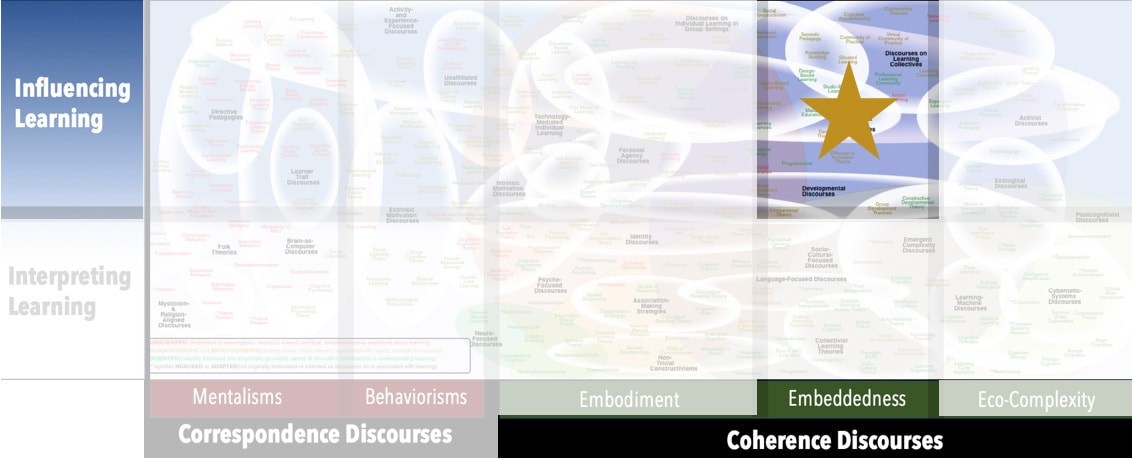Focus
Gendered and sexualized norms that channel perceptions and perpetuate interpretationsPrincipal Metaphors
- Knowledge is … scope of interpretations and actions
- Knowing is … conscientious acting
- Learner is … a change agent (individual or collective)
- Learning is … interrogating (the conditions of one’s existence) and participating (in efforts to enact meaningful change)
- Teaching is … learning alongside (i.e., interrogating and co-participating)
Originated
1990sSynopsis
Queer Pedagogy blends Critical Pedagogy and Queer Theory (see below), both of which lean heavily on Marxism (under Activist Discourses) and Post-Structuralism, with common goals of interrogating pervasive social norms and taxonomies. Queer Pedagogy attends to some of the conditions that enable and constrain learning in the classroom, such as the role of identities, the teacher–student relationship, priorities and refusals evident in curricula, and the politics of bodies enacted (in washroom rules, gym classes, etc.). The theory is positioned as both criticism of and potential support to the work of educators. Associated discourses include:- Heteronormativity (Michael Warner, 1990s) – the assumption that heterosexuality is the “normal” and “natural” mode of sexual orientation, along with the privileges accrued to those who conform to this assumption. Heteronormativity can operate at personal, social, and cultural levels.
- Heteropatriarchy (Cisheteropatriarchy) (Francisco Valdez, 1990s) – combining “heterosexual” and “patriarchy” (and “cisgender” – i.e., same gender as named at birth), a binary-based, normative attitude toward gender identity that is argued to draw on and to preserve male power dynamics
- Queer Theory (Gloria Anzaldúa, 1990s) – a diversely interpreted discourse that originally emerged from Critical Theory (see Critical Pedagogy). It is perhaps most often defined in terms of a challenge to Heteronormativity and its associated assumption of rigidly binary gender categories. Queer Theory frames these and other popular binaries as social and cultural constructs.
Commentary
Included among Activist Discourses, Queer Pedagogy is subject to the same sorts of dismissive criticisms from parties offended and/or threatened by the challenges it presents to entrenched social norms and power structures. In addition, Queer Pedagogy is frequently criticized as obfuscating – as it, for example, signals a focus on gender identities in its name while asserting that “queer” is not specific to a sexual role or gender status.Authors and/or Prominent Influences
Deborah Britzman; William PinarStatus as a Theory of Learning
Queer Pedagogy is not a theory of learning, as it does not address the complex dynamics of learning.Status as a Theory of Teaching
Queer Pedagogy is a theory of teaching that is oriented toward recognizing and taking constructive action against unhealthy power dynamics and other injustices.Status as a Scientific Theory
Queer Pedagogy does not meet our requirements of a scientific theory. However, it is informed by well-known and empirically grounded theories Embodiment Discourses and Embeddedness Discourses, including most prominently Socio-Cultural Theory.Subdiscourses:
- Heteronormativity
- Heteropatriarchy (Cisheteropatriarchy)
- Queer Theory
Map Location

Please cite this article as:
Davis, B., & Francis, K. (2023). “Queer Pedagogy” in Discourses on Learning in Education. https://learningdiscourses.com.
⇦ Back to Map
⇦ Back to List
